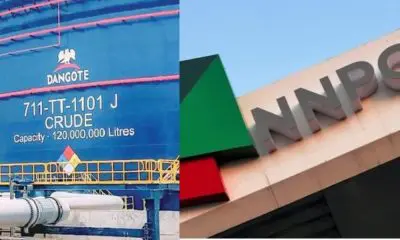Nigeria’s state oil company has locked in crude supplies for Africa’s largest refinery through 2027.
The Nigerian National Petroleum Company Limited signed a two-year crude supply agreement with Dangote Petroleum Refinery in August, ensuring steady feedstock for the 650,000-barrel-per-day facility in Lekki, Lagos.
The deal represents a significant expansion of the Federal Government’s naira-for-crude initiative, designed to reduce foreign exchange pressure while boosting domestic refining capacity.
Since October 2024, NNPC has allocated 82 million barrels of crude oil to the refinery, with 49.3 million barrels, representing 60 percent of the total, sold in naira rather than dollars.
The agreement comes after Dangote Refinery briefly suspended petrol sales in naira, citing exhaustion of its crude-for-naira allocation.
Within hours, intervention from the Naira-for-Crude Technical Committee Chairman reversed the decision, restoring fuel supplies to the domestic market.
NNPC’s Chief Corporate Communications Officer, Andy Odeh, confirmed the company continues allocating crude in naira under the government initiative.
“NNPC Limited, DPRP (Dangote Petroleum Refinery and Petrochemical), and NMDPRA periodically reconcile the volume and cost of product supplied in naira commensurate with the crude delivered,” Odeh said.
The supply framework demonstrates NNPC’s commitment to consistent crude allocation. The company allocated three naira crude cargoes to Dangote in August, with five cargoes each scheduled for September and October 2025.
August loading operations have been completed, while September operations are underway with two vessels currently at terminals undergoing pre-loading formalities. This structured approach aims to eliminate the supply uncertainties that previously forced Dangote to rely heavily on United States imports for feedstock.
The Steering Committee of the Domestic Crude Oil and Refined Products Sales in Local Currency Initiative has provided high-level assurance for the arrangement.
Finance Minister and Coordinating Minister of the Economy Wale Edun chairs the committee, which includes representatives from the Budget Ministry, Federal Inland Revenue Service, NMDPRA, NNPC, Central Bank of Nigeria, Afreximbank, and Dangote Refinery.
Mohammed Manga, Director of Information at the Finance Ministry, confirmed that recent committee meetings resolved concerns about the program’s continuity. “The Federal Government remains fully committed to ensuring energy security, protecting consumers and maintaining stability in the domestic petroleum products market,” he stated.
Oil marketers have welcomed the agreement as crucial for Nigeria’s energy security. Hammed Fashola, Vice President of the Independent Petroleum Marketers Association of Nigeria, described it as bringing much-needed stability to the market.
“It is a good development. It will bring stability, sort of,” Fashola said, referencing the positive impact when the program initially launched.
IPMAN spokesman Chinedu Ukadike praised the deal but urged government to extend domestic crude supply obligations to modular refineries. “You cannot be exporting crude while Dangote is importing crude,” Ukadike said, emphasizing the logic of supplying local refineries first.
The agreement marks a turning point since President Bola Tinubu ordered the naira-for-crude deal last year amid supply challenges facing the refinery. While Dangote has repeatedly appreciated Tinubu’s intervention in lowering crude prices, the company had complained about insufficient local supply forcing reliance on international markets.
The two-year framework provides predictability for Nigeria’s petroleum product supply chain. With Dangote Refinery operating at full capacity and receiving consistent crude allocation, the country expects reduced dependence on imported refined products.
Industry observers anticipate the deal will help stabilize pump prices and improve product availability at filling stations nationwide. The arrangement also supports the government’s broader economic goals of reducing foreign exchange spending on petroleum imports while maximizing value from Nigeria’s crude oil resources.
The agreement’s success will depend on NNPC’s ability to maintain consistent crude allocations while balancing export obligations and other domestic refinery needs. With government backing and industry support, the deal positions Nigeria to achieve greater energy independence through 2027.























